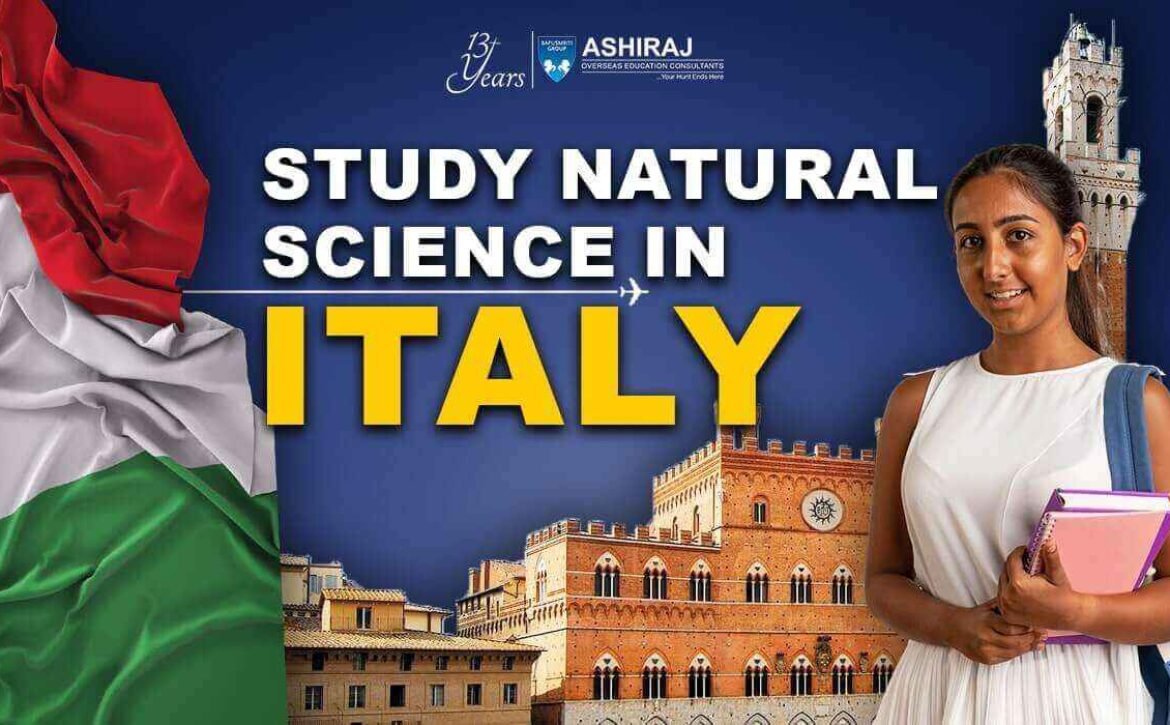
Natural Science in Italy
Natural Science in Italy is a fascinating realm that marries the country’s rich history with its contemporary scientific pursuits. From the ancient observations of natural phenomena by luminaries like Leonardo da Vinci to the cutting-edge research conducted in modern laboratories, Italy has been a cradle for the evolution of natural sciences. The diverse landscapes, ranging from the Alps to the Mediterranean, offer a unique canvas for scientific exploration, shaping studies in geology, biology, and environmental science.
In Italy, the legacy of Galileo Galilei’s astronomical discoveries echoes through the centuries, inspiring a continued passion for understanding the natural world. Today, research institutions and universities across the country delve into a spectrum of scientific disciplines, contributing to global advancements. This exploration of Natural Science in Italy encapsulates a narrative that seamlessly weaves together tradition and innovation, reflecting the nation’s enduring curiosity about the wonders of the universe.
Why to Study Natural Science in Italy?
- Rich Historical Legacy: Italy boasts a profound historical connection to natural science, with pioneers like Galileo Galilei laying the foundation for modern exploration.
- Diverse Ecological Landscapes: The country’s varied geography, from the Alps to the Mediterranean, provides a natural laboratory for studying diverse ecosystems, offering unparalleled opportunities for hands-on experience.
- Cultural Integration: Studying natural science in Italy means immersing oneself in a culture that has always valued art and science. The integration of these elements enhances the overall educational experience.
- Cutting-edge Research Facilities: Italy houses world-class research institutions and universities equipped with state-of-the-art laboratories, fostering an environment conducive to groundbreaking scientific discoveries.
- Global Collaboration Opportunities: The country’s scientific community actively engages in international collaborations, providing students with networking opportunities and exposure to a broader scientific community.
- Interdisciplinary Approach: Italian educational institutions emphasize an interdisciplinary approach, encouraging students to explore connections between natural science and other fields, promoting a holistic understanding of the subject.
- Innovation and Technology: Italy’s commitment to innovation and technology ensures that students studying natural science are exposed to the latest advancements, preparing them for dynamic careers in the scientific realm.
In summary, choosing to study natural science in Italy offers a unique blend of historical significance, diverse environments, and cutting-edge resources, making it a compelling destination for aspiring scientists and researchers. Embrace the legacy and possibilities that Natural Science in Italy presents for a comprehensive and enriching educational journey.
Top Universities to Study Natural Science in Italy
University | QS World University Ranking 2023 | Type of University | Average Annual Fees | Programs Offered |
University of Bologna | 180 | Public | €1,000 – €3,900 | Physics, Biology, Environmental Science |
University of Milan | 188 | Public | €1,500 – €4,000 | Earth Sciences, Chemistry, Biotechnology |
Sapienza University of Rome | 217 | Public | €850 – €2,800 | Geology, Astrophysics, Environmental Engineering |
University of Padua | 229 | Public | €1,500 – €4,000 | Botany, Physics, Climate Science |
Politecnico di Milano | 251-260 | Public | €2,000 – €6,000 | Environmental Engineering, Materials Science, Physics |
When considering Natural Science in Italy, the top universities play a crucial role. The University of Bologna, ranking 180, offers a diverse range of programs such as Physics and Environmental Science, with average annual fees ranging from €1,000 to €3,900. The University of Milan, at 188, provides programs in Earth Sciences and Biotechnology, with fees averaging between €1,500 and €4,000. Sapienza University of Rome, ranking 217, offers courses in Geology and Astrophysics, with annual fees ranging from €850 to €2,800. The University of Padua, at 229, has programs in Botany and Climate Science, with fees between €1,500 and €4,000. Lastly, Politecnico di Milano, ranking 251-260, focuses on Environmental Engineering and Physics, with average fees from €2,000 to €6,000. These institutions not only excel in academic rankings but also provide a diverse array of programs at various price points, making them attractive options for those passionate about natural sciences.
Course Curriculum for Natural Science in Italy
- Interdisciplinary Foundation: The course curriculum of Natural Science in Italy is built on an interdisciplinary foundation, encouraging students to explore the connections between various scientific disciplines.
- Core Subjects: Fundamental subjects such as Physics, Chemistry, Biology, and Earth Sciences form the core of the curriculum, providing a comprehensive understanding of the natural world.
- Fieldwork and Practical Experience: Emphasis is placed on hands-on learning through fieldwork and practical experiments. Italy’s diverse ecosystems serve as natural laboratories for students to apply theoretical knowledge.
- Cultural Integration: The curriculum uniquely integrates cultural aspects, showcasing Italy’s historical contributions to natural science. Students gain insights into the intersection of art, history, and science.
- Research Opportunities: Universities offer research opportunities, allowing students to engage in cutting-edge projects. This exposure prepares them for future contributions to the scientific community.
- Global Perspectives: Natural Science in Italy incorporates global perspectives, addressing contemporary environmental challenges and fostering a sense of responsibility towards sustainable practices.
- Flexibility and Electives: The curriculum offers flexibility with elective courses, enabling students to tailor their academic journey based on specific interests within the broader field of natural science.
- Language Proficiency: As courses are often taught in English, international students find it accessible, enhancing the overall learning experience.
In summary, the course curriculum of Natural Science in Italy provides a holistic education, blending core scientific principles with practical experience, cultural integration, and global perspectives. This well-rounded approach makes studying Natural Science in Italy an enriching and comprehensive educational endeavor.
Eligibility Criteria & Admission Requirements for Natural Science in Italy
- Academic Qualifications: Applicants typically need a bachelor’s degree in a relevant field of natural science or a closely related discipline. The degree should be equivalent to the Italian Laurea (180 ECTS credits).
- IELTS or TOEFL Scores: Proficiency in English is crucial. For IELTS, a minimum score of 6.5 is generally required, and for TOEFL, a score of at least 80 (iBT) is commonly accepted.
- GRE or GMAT Scores: Some universities may require GRE or GMAT scores. A competitive score in the relevant sections is advantageous. For GRE, a combined score of around 310, and for GMAT, a score of 600 or above is often preferred.
- Passport & Student Visa: A valid passport is mandatory. Additionally, securing a student visa is essential. Applicants must comply with the visa application requirements outlined by the Italian authorities.
- Academic Certificates: Transcripts and certificates from previous academic institutions are necessary. These documents should be translated into Italian or English, depending on the university’s requirements.
- Work Experience: While work experience is not always mandatory, some programs may prefer applicants with relevant professional experience. This can strengthen the application, especially for advanced degrees or specialized programs.
Test/Requirement | Minimum Score |
IELTS | 6.5 |
TOEFL (iBT) | 80 |
GRE | 310 |
GMAT | 600 |
Meeting these eligibility criteria ensures that aspiring students are well-prepared to embark on their academic journey in Natural Science in Italy, meeting the standards set by renowned Italian universities.
Documents Required for Studying Natural Science in Italy
- Passport: A valid passport is a fundamental document required for the application process. Ensure it has sufficient validity beyond your intended period of stay.
- Letters of Recommendation (LOR): Typically, two LORs are necessary. These letters should come from academic or professional references who can attest to your qualifications and suitability for the program.
- Statement of Purpose (SOP): The SOP is a personal statement outlining your academic and career goals, why you’re interested in the chosen program, and how it aligns with your future plans.
- Curriculum Vitae (CV): A comprehensive CV highlighting your educational background, work experience, research projects, and any relevant achievements is essential.
- Official High School Transcripts and Educational Certificates: Provide transcripts and certificates from your high school, showcasing your academic achievements. These documents should be translated into Italian or English, depending on the university’s requirements.
- Work Experience Certificate: If applicable, a certificate verifying your work experience can strengthen your application, especially for programs that value practical experience.
- Proof of Financial Resources: To obtain a student visa, you’ll need to demonstrate your ability to cover tuition fees and living expenses. This could include bank statements, scholarship letters, or financial guarantee letters.
Ensuring the submission of these documents is a crucial step in the application process for Natural Science in Italy, providing universities with a comprehensive overview of your qualifications and readiness for academic pursuits in the country.
Admission Process for Natural Science in Italy
- Research Universities: Begin by researching universities in Italy offering natural science programs. Consider their rankings, faculty, and specific areas of expertise within natural science.
- Check Eligibility: Review the admission requirements for each university. Ensure you meet academic qualifications, language proficiency, and any standardized test score requirements (GRE/GMAT, IELTS/TOEFL).
- Prepare Documents: Gather essential documents, including your passport, academic transcripts, letters of recommendation (LORs), statement of purpose (SOP), curriculum vitae (CV), and proof of financial resources.
- Online Application: Complete the online application form provided by the chosen universities. Ensure accurate information and submit all required documents electronically.
- Application Fee: Pay the application fee as specified by the university. This fee covers the administrative costs of processing your application.
- Wait for Admission Decision: Universities will review your application, and you’ll receive an admission decision. This process may take a few weeks to months.
- Acceptance and Visa Process: Upon acceptance, follow the university’s instructions for enrollment. Apply for a student visa, providing necessary documents such as the acceptance letter, proof of financial resources, and a valid passport.
- Travel Arrangements: Once the visa is approved, make travel arrangements to Italy. Attend any orientation sessions provided by the university.
By following these steps, aspiring students can navigate the admission process for Natural Science in Italy smoothly, ensuring a well-prepared and successful entry into their chosen academic program.
“Education is the most powerful weapon which you can use to change the world.”
Nelson Mandela
Cost of Natural Science Course in Italy
- Tuition Fees: Tuition fees for natural science programs in Italy vary. Public universities generally have lower fees, ranging from €1,000 to €4,000 per year, while private institutions may charge higher, averaging around €6,000 to €20,000.
- Living Expenses: The cost of living in Italy varies based on the city. On average, students should budget between €800 to €1,500 per month, covering accommodation, food, transportation, and miscellaneous expenses.
- Accommodation: Housing costs depend on the type of accommodation. Rent for shared apartments or university dormitories can range from €300 to €700 per month.
- Books and Materials: Budget for academic materials, including books and study supplies, which may cost around €200 to €500 annually.
- Health Insurance: Health insurance is mandatory for international students. The cost is approximately €150 to €200 per year, depending on the coverage.
- Miscellaneous Costs: Include additional expenses for social activities, internet, and personal needs, estimating around €100 to €200 per month.
- Travel and Leisure: Budget for occasional travel and leisure activities. Italy offers diverse cultural experiences. Allocate around €500 to €1,000 per year for these activities.
Understanding the cost of studying Natural Science in Italy helps students plan their budget effectively. While costs vary, Italy’s rich academic and cultural offerings make it a compelling destination for scientific pursuits.
Scholarships for Natural Science Courses in Italy
Scholarship Name | Eligibility Criteria | Amount | Application Deadline |
Merit-Based Scholarships | Academic excellence in natural science studies. | €2,000 – €10,000 | Varies (Check university website) |
Italian Government Scholarships | Open to international students pursuing natural science. | Full tuition waiver, stipend | Varies (Check Ministry of Foreign Affairs) |
University-specific Scholarships | Criteria set by individual universities. | Varies | Dependent on university’s admissions timeline |
Erasmus Mundus Scholarships | European joint master’s programs in natural science. | Full/partial tuition, living allowance | Varies (Check specific program deadlines) |
INPS Scholarships | For international students with financial need. | €5,000 – €10,000 | Varies (Check INPS website) |
Securing a scholarship is a viable option for those pursuing Natural Science in Italy. Merit-based scholarships reward academic achievements, while the Italian Government Scholarships provide comprehensive support. Universities may offer their specific scholarships, and Erasmus Mundus facilitates joint programs. INPS Scholarships cater to financial needs. It’s crucial to check each scholarship’s eligibility, application requirements, and deadlines, ensuring timely and accurate submissions for a successful scholarship application process.
Career Opportunities After Natural Science in Italy
Job Profile | Description | Average Salary |
Research Scientist | Conducts scientific research, experiments, and analysis in various natural science fields. | €35,000 – €60,000 per year |
Environmental Consultant | Advises organizations on environmental issues, sustainability, and compliance with regulations. | €30,000 – €50,000 per year |
Data Analyst/Scientist | Analyzes and interprets scientific data, using statistical techniques and software tools. | €25,000 – €45,000 per year |
Biotechnologist | Applies biological principles to develop products and technologies for various industries. | €30,000 – €55,000 per year |
Geoscientist | Studies the Earth’s structure, composition, and processes, often working in fields like geology or environmental science. | €35,000 – €65,000 per year |
Natural Science graduates in Italy find diverse career paths. Research Scientists engage in groundbreaking studies, earning competitive salaries. Environmental Consultants contribute to sustainable practices, while Data Analysts play a crucial role in data-driven decision-making. Biotechnologists drive innovation in biotechnology, and Geoscientists explore the Earth’s mysteries. Salaries vary based on experience and expertise, providing ample opportunities for growth and fulfilling careers in the dynamic field of Natural Science in Italy.
Frequently Asked Questions About Natural Science in Italy
Yes, many universities in Italy offer natural science programs in English, making it accessible to international students.
Admission requirements include a relevant bachelor’s degree, language proficiency (IELTS/TOEFL), and in some cases, standardized test scores (GRE/GMAT).
Yes, various scholarships are available, including merit-based scholarships, government scholarships, and university-specific scholarships.
Tuition fees range from €1,000 to €20,000 per year, and living expenses vary between €800 to €1,500 per month, depending on the city.
Yes, international students are generally allowed to work part-time during their studies to supplement living expenses.
Graduates can pursue careers as Research Scientists, Environmental Consultants, Data Analysts, Biotechnologists, and Geoscientists, with competitive salary ranges.
The duration varies. Bachelor’s programs typically take 3 years, while master’s programs range from 1 to 2 years.
While work experience is not always mandatory, some programs may prefer applicants with relevant professional experience.
Programs are often offered in English, making them accessible to international students. However, it’s advisable to check specific program requirements.
Once accepted into a program, apply for a student visa by submitting required documents, including the acceptance letter, proof of financial resources, and a valid passport.




